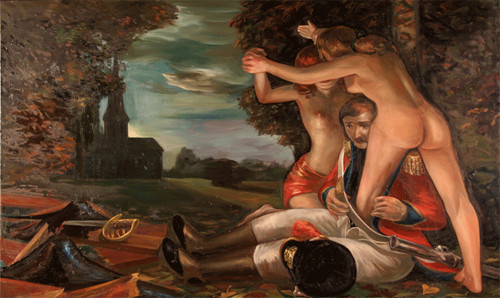Gonçalo Pena
17 Mar - 01 May 2010
GONÇALO PENA
"Garden Cities of To-morrow"
Opening: Wednesday 17th March 2010 / 20 pm
Exhibition: from March 17th to May 1st 2010
Eighteen months after his first individual exhibition in Lisbon (at the Graça Brandão Gallery) Gonçalo Pena (born in Lisbon in 1967) is now presenting his works at the Fucares Gallery in Madrid with an exhibition entitled Garden Cities of To-Morrow. This topical name is taken from an early 20th century town planning manifesto by Ebenezer Howard, but its fragmentary nature offers the chance to explain the explicable in the world depicted by this painting. The way this title was superficially intuited reveals its deep realism.
At the same time, important emotional relationships are uncovered in the name and what this refers to: nature, industry as a metaphor, the cosmogonies, the garden and the boudoir. More than that; far beyond it - the title reveals the incessant flow between these perceptible elements, captured by the author’s voracious panphagic, half-insane appetite. The figuration and the elements comprising it function as a place - and doubly so as bait - for a journey. The apparent representativity of these elements fixes and draws your glance through the spaces that maintain them.
These paintings seemingly attempt to depict a particular narrative or other. The first problem for its interpreter is the absence of connection: one gets no further than recognising mythical elements and familiar symbols. Elements of syntax are missing; meaning is suspended as in an oral narration that frequently lacks sound. A strangeness emerges. It is in this strangeness, in the emptiness, the nothing, the insignificant, sensed by looks and gestures, that one finds the true vocative power of this work. Gardens and industry: the flavourless spaces into which relationships and movements are cast without object, to an anti-modern and melancholy pace, and in another, outlining the desire for revolutionary collusion - between Jean Meslier’s Testament and the psychedelic utopia of the Superstudio.
Formally, this emotional, existential investment has recently been approached from the scene-body principle. The painting "Eden Teatro" (2007) is the matrix on which the current exhibits are based. Eden Teatro refers to a famous building in the Lisbon Baixa district designed by modernist architect Cassiano Branco. This building’s name and history contain the same world that is presented in the paintings of Gonçalo Pena. "Everything that is solid dissolves in the air". The painting referred to depicts a monk building a house in a tree. The narrative is no more than a suggestion, or, in the opposite sense, a pretext for presenting world sensations. More important than anything; a great part of what is painted is always untranslatable. There beyond the topic, the form and the appearance - somewhere.
André Poejo (2010)
"Garden Cities of To-morrow"
Opening: Wednesday 17th March 2010 / 20 pm
Exhibition: from March 17th to May 1st 2010
Eighteen months after his first individual exhibition in Lisbon (at the Graça Brandão Gallery) Gonçalo Pena (born in Lisbon in 1967) is now presenting his works at the Fucares Gallery in Madrid with an exhibition entitled Garden Cities of To-Morrow. This topical name is taken from an early 20th century town planning manifesto by Ebenezer Howard, but its fragmentary nature offers the chance to explain the explicable in the world depicted by this painting. The way this title was superficially intuited reveals its deep realism.
At the same time, important emotional relationships are uncovered in the name and what this refers to: nature, industry as a metaphor, the cosmogonies, the garden and the boudoir. More than that; far beyond it - the title reveals the incessant flow between these perceptible elements, captured by the author’s voracious panphagic, half-insane appetite. The figuration and the elements comprising it function as a place - and doubly so as bait - for a journey. The apparent representativity of these elements fixes and draws your glance through the spaces that maintain them.
These paintings seemingly attempt to depict a particular narrative or other. The first problem for its interpreter is the absence of connection: one gets no further than recognising mythical elements and familiar symbols. Elements of syntax are missing; meaning is suspended as in an oral narration that frequently lacks sound. A strangeness emerges. It is in this strangeness, in the emptiness, the nothing, the insignificant, sensed by looks and gestures, that one finds the true vocative power of this work. Gardens and industry: the flavourless spaces into which relationships and movements are cast without object, to an anti-modern and melancholy pace, and in another, outlining the desire for revolutionary collusion - between Jean Meslier’s Testament and the psychedelic utopia of the Superstudio.
Formally, this emotional, existential investment has recently been approached from the scene-body principle. The painting "Eden Teatro" (2007) is the matrix on which the current exhibits are based. Eden Teatro refers to a famous building in the Lisbon Baixa district designed by modernist architect Cassiano Branco. This building’s name and history contain the same world that is presented in the paintings of Gonçalo Pena. "Everything that is solid dissolves in the air". The painting referred to depicts a monk building a house in a tree. The narrative is no more than a suggestion, or, in the opposite sense, a pretext for presenting world sensations. More important than anything; a great part of what is painted is always untranslatable. There beyond the topic, the form and the appearance - somewhere.
André Poejo (2010)

